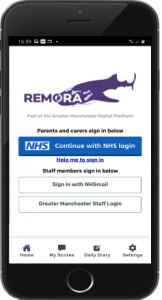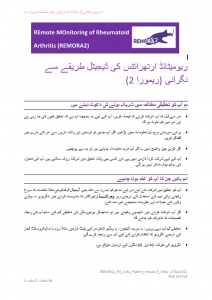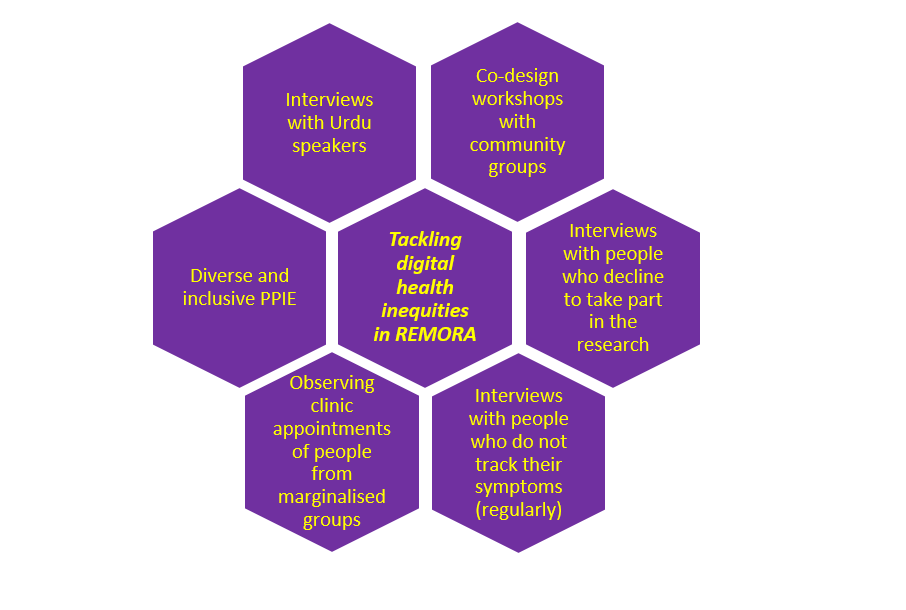The REmote MOnitoring of Rheumatoid Arthritis (REMORA) research programme
Research team: Professor Caroline Sanders, Dr Yumna Masood
Chief investigators: Professor William Dixon, Dr Sabine van der Veer, The University of Manchester
Funder: National Institute for Health Research (Programme Grants for Applied Research)

Figure 1: Login interface of the REMORA app
Rheumatoid arthritis (RA) is a common chronic inflammatory disease. Management of RA relies on patients reporting their symptoms, but answering the rheumatologist’s
question “How have you been since your last visit?” is challenging for patients because it asks them to recall and summarise symptoms, typically over 6-12 months. This results in incomplete and inaccurate information, which may lead to poor treatment decisions and worse outcomes.
REmote MOnitoring of Rheumatoid Arthritis (REMORA) is a research programme to develop, evaluate and scale up an integrated symptom tracking intervention. This intervention enables people with RA to track their symptoms daily using an app on their smartphone (see image) and share and discuss the results with their clinical team. The tracked symptom data is available in (1) the REMORA app for patients to better self-manage their condition, (2) the hospital’s electronic health record system for clinical teams to make better and shared treatment decisions, and (3) a central repository for researchers to answer patient-important questions.
After a successful pilot study (2015-2017) and an infrastructure project to enhance REMORA’s scalability (2020-21), the team is now conducting a feasibility trial (2022) followed by a stepped wedge trial (2022-24) involving all rheumatology outpatient departments in Greater Manchester and North West London.
Tackling digital health inequities in REMORA
One of the four workstreams in REMORA is fully dedicated to understanding and enhancing digital inclusion. By combining patient and public involvement and engagement (PPIE), co-design workshops, and qualitative and quantitative research (see Figure 2 below), the team are exploring and addressing barriers for people with RA from marginalised groups to taking part in the REMORA research and to tracking their symptoms. This will contribute to maximising digital inclusion and reducing the negative impact of integrated symptom tracking on health equity for people with RA.
Diverse and inclusive PPIE
From the start of the programme in 2015, REMORA has had a very engaged and successful PPIE group. For the trial, the group increased its diversity in terms of gender, age and ethnicity. All members receive training and support to enable them to contribute equally to reviewing intervention and study materials, testing the app, recruiting and helping study participants, designing and conducting interviews and workshops, and disseminating research findings.
Interviews with Urdu speakers

Figure 2: Sample of Urdu translated patient-facing materials
One of the Urdu-speaking researchers in the team interviews Urdu-speaking patients who are not eligible to take part in the REMORA trial because they do not speak English. For recruitment, the team use patient-facing materials that have been translated from English into Urdu by a professional translation service (see image).
Co-design workshops with community groups
With support from the PPIE group, the team is organising co-design workshops with community groups to review the REMORA app and supporting materials to identify opportunities to make these accessible for a wider range of people.
Interviews with people who decline participation or struggle to track their symptoms
The team will interview people who are eligible to take part but decline participation in the trial. They will also invite people for an interview who decide to take part but then do not start tracking their symptoms or only track their symptoms irregularly. The interviews will help to better understand people’s reasons for declining to take part and barriers to tracking their symptoms, as well as how these could be addressed.
Observing clinic appointments of people from marginalised groups
The team will observe clinic appointments of patients from marginalised groups who tracked their symptoms and then discuss the results with their doctor. The aim is to explore how digital inequities related to symptom tracking may be visible and reflected in patient-doctor interactions.

Figure 2: Overview of activities to tackle digital health inequities in REMORA




0 Comments